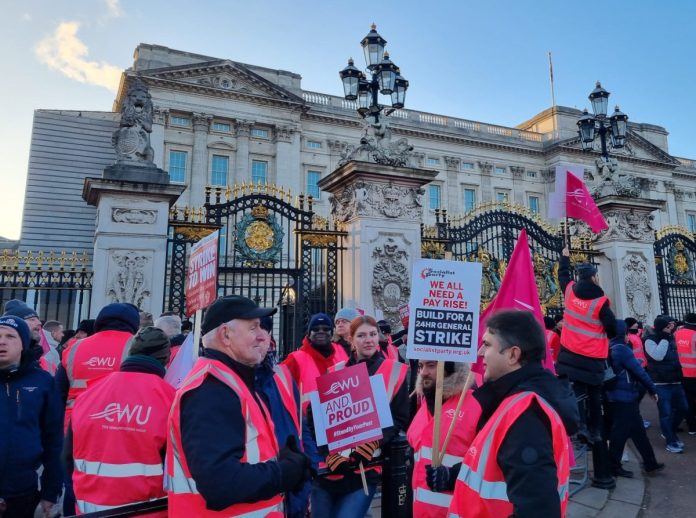2023 is beginning as 2022 ended, with significant nationwide strike action, this time of railway workers in RMT and Aslef. Postal workers continue their fight against Royal Mail bosses and are gearing up for a mandatory reballot after six months of strikes. NHS workers, nurses and ambulance workers have more strike dates set for this month. Civil servants in PCS across numerous government agencies continue their targeted strikes.
And even more sets of workers could join the fold. Teachers in NEU and NASUWT have strike votes that come to an end on 13 and 9 January respectively. Firefighters in FBU have a vote that ends on 30 January. Junior doctors in the BMA will start their strike vote on 9 January.
The reasons to strike are only growing. Household income is set to fall by another 3.8% on average in 2023, an even bigger hit than in 2022, according to the Resolution Foundation. Pensions and benefits continue to fall further behind the real cost of living, and public services like the NHS are crumbling from years of underfunding, profiteering and neglect.
The attacks of the bosses and the government are not just directed at one section of workers, they are an attempt to make the whole working class pay for the crisis. No truck can be given to attempts by politicians and the right-wing media to divide strikers into those ‘deserving’ and ‘undeserving’ of a pay rise. All workers need a pay rise that at least matches inflation.
Terrified of workers’ growing confidence and preparedness to fight, Rishi Sunak is talking up new punitive anti-strike laws. The response from the workers’ movement to such attacks must go beyond legal challenges to include coordinated strike action.
The leaderships of the trade unions are meeting in the first weeks of the year to decide their strategy moving forward. The Socialist Party supports the demand being made by strikers on the picket lines to ‘all strike together’. The TUC should name the date for all those workers with a live strike mandate to take action together, potentially in early February to maximise numbers involved, as a major step towards a 24-hour general strike. If the TUC leaders refuse to act, the willing trade union leaders themselves must take responsibility to arrange such action.
United workers’ action on this scale would be a clear demonstration of workers’ huge potential collective power, it would further boost workers’ confidence and further tighten the screws on the Tories and the bosses.
Strike wave continues into 2023
- All strike together for a real pay rise!
- Prepare now for a 24-hour general strike
- If the Tories try to implement their new anti-trade union plans, they must be met with a 24-hour general strike
- The union leaders and the TUC should launch an appeal to build a massive strike fund to assist those unions on the front line
- Kick out the Tories! But Starmer’s New Labour doesn’t speak for us, so fight for a new working-class party
- No more austerity – end cuts and privatisation in the NHS and councils, reject council tax rises
- Nationalise rail, mail, energy and utilities under democratic working-class control and management, with compensation only on the basis of proven need
- Take the wealth off the super-rich. For a socialist alternative to capitalism’s poverty and crisis
RMT
Strikers told Birmingham Socialist Party members: “The Tories and the press make out that we’re just interested in getting more money, but that’s not what this strike is about. We just want to go to work and be able to do our jobs without our terms, conditions and working hours being messed about.”
Upcoming strike dates:
Rail
- RMT: 6,7 January
- Aslef: 5 January
NHS
- Nurses, RCN in England: 18,19 January
- Ambulances: 11 January GMB and Unison, 23 January Unison
Civil service
- PCS members are participating in targeted action throughout January in the National Highways, DVSA, DVLA, DWP and Rural Payments
Scottish teachers
- EIS, SSTA, NASUWT: 10-11 January
Strike votes pending
- NEU teachers – vote closes 13 January
- NASUWT teachers – vote closes 9 January
- FBU firefighters – vote closes 30 January
- BMA junior doctors – vote opens 9 January







